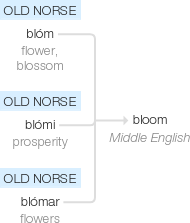Bloom
Middle English: from Old Norse blóm ‘flower, blossom’, blómi ‘prosperity’, blómar ‘flowers’.
wiktionary
From Middle English blome, from Old Norse blóm, from Proto-Germanic *blōmô(“flower”). Doublet of bloom (“spongy mass of metal”); see there for more.
From Middle English bloom(“a blossom”).
From Middle English blome, from Old English blōma(“flower; lump of metal”), from Proto-Germanic *blōmô(“flower”). Cognate with West Frisian blom, Dutch bloem, German Blume, Icelandic blóm, Danish blomme, Gothic 𐌱𐌻𐍉𐌼𐌰( blōma). Related to blow, blade, blead; also related to flower, foil, and belladonna.
etymonline
bloom (n.1)
"blossom of a plant," c. 1200, a northern word, from a Scandinavian source akin to Old Norse blomi "flower, blossom," also collectively "flowers and foliage on trees;" from Proto-Germanic *blomon (source also of Old Saxon blomo, Middle Dutch bloeme, Dutch bloem, Old High German bluomo, German Blume, Gothic bloma), from PIE *bhle- (source also of Old Irish blath "blossom, flower," Latin flos "flower," florere "to blossom, flourish"), extended form of root *bhel- (3) "to thrive, bloom." Related to Old English blowan "to flower" (see blow (v.2)).
Not extended like 'flower' to a whole 'flowering plant', and expressing a more delicate notion than 'blossom', which is more commonly florescence bearing promise of fruit, while 'bloom' is florescence thought of as the culminating beauty of the plant. Cherry trees are said to be in blossom, hyacinths in bloom. [OED]
Transferred sense, of persons, "pre-eminence, superiority," is from c. 1300; meaning "state of greatest loveliness" is from early 14c.; that of "blush on the cheeks" is from 1752. Old English had cognate bloma, but only in the figurative sense of "state of greatest beauty;" the main word in Old English for "flower" was blostm (see blossom (n.)).
bloom (n.2)
"rough mass of wrought iron," from Old English bloma "lump of metal; mass," which is of unknown origin. Identical in form to bloom (n.1), and sometimes regarded as a secondary sense of it, but evidence of a connection is wanting.
bloom (v.)
mid-13c., blomen, "bear flowers, blossom, be in flower," from an Old Norse noun from the same source as bloom (n.1). Related: Bloomed; blooming.
